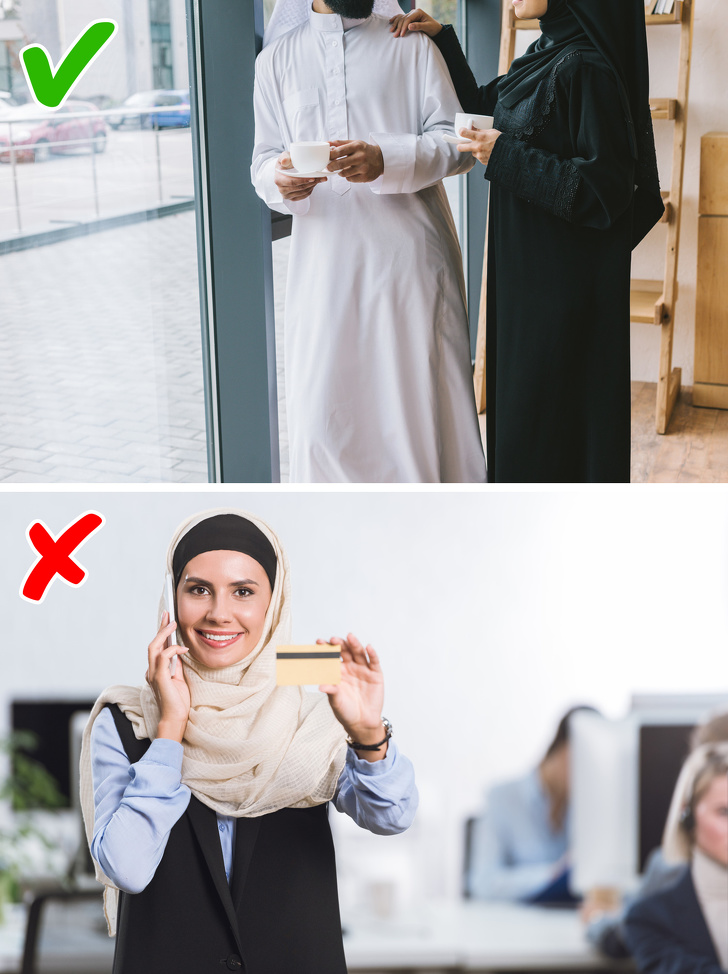From choosing a husband to taking a trip on public transport: in this country, almost everything is prohibited for women. According to the Gender Gap report from the World Economic Forum, Saudi Arabia is ranked 129 out of 134. How do women really live in a country where women’s rights are extremely limited? Which of the stereotypes we know are true and what are the myths?
We will talk about the most unusual bans that local women have to face every day in Saudi Arabia. Read the article to the end to find out how women are punished for not obeying the strict rules.
1. They Can’t Go Anywhere Without A Mahram

Women in Saudi Arabia have no right to go anywhere without a husband or male relative. This male person who accompanies a woman is called Mahram.
Without his approval, a woman cannot leave the country, get a job, get married, go to college, or even undergo surgery.
If a woman needs to go to the police, a Mahram must be able to identify and speak for the woman, because the hijab cannot be removed.
In such conditions, even complaining about a Mahram is impossible. But local women have no mutiny against his. Rather, they actively protect their right to be in the care of a man.
2. Public Transportation Is Prohibited
Well, if you can’t drive, you can always use public transportation, right? For women in Saudi Arabia, it is not that easy.
You are allowed to take a train, but only in a separate car at the end of the train. And most bus companies refuse to transport women.
That is why women in Saudi Arabia need to walk, take a taxi, or be transported by their personal driver.
3. Women Should Wear A Large Black Dress
On the streets, women in Saudi Arabia cover the entire body, leaving only the oval of the face, hands, and feet open.
A black abaya (a long dress with sleeves) and a hijab (a headdress) are the only things a woman can wear. Clothing should be made of thick, loose fabric and should not highlight their curves.
The rules can be more or less strong. They mainly depend on the region. For example, Jeddah is a more liberal city and the Najd region, where the House of Al Saud lives, is very strict and conservative.
In some regions, women still need to wear a niqāb, a special outfit that covers the face and leaves only the eyes open.
Mohammad bin Salman bin Abdulaziz Al Saud is the Crown Prince of Saudi Arabia and stated that women have the right to reject this strict dress code.
We wonder if women will listen to the recommendation since public opinion really matters to them. Unfortunately, if a woman is raped, she can be found guilty if her clothing is deemed too revealing.
4. University Education Is Not Prohibited, But It Is Not Necessary
Women can study, but there are many limitations. This may seem strange, but the percentage of women in Saudi Arabia with a university degree is actually higher than that of men. But the quality of college education for women is far from good.
If a woman’s guardian gives her permission, she can study abroad, but it is difficult for women to obtain a scholarship. Most women have a pedagogical or scientific education. But they generally don’t work after college.
5. They Don’t Work Too Much
Despite the many reforms and the lifting of bans, the percentage of women working here is only 17%. This means that most women in Saudi Arabia stay home and care for their children.
Shariah does not prohibit women from working, provided they do not neglect their family responsibilities. If a woman wants to work, she needs a man’s permission.
The choice of professions is not very wide: they can be doctors, nurses, and educators, as long as they avoid meeting new men.
Women politicians and lawyers are rare exceptions. For women, it is much more difficult to develop a career than for men, since they receive less and do not have bonuses like health insurance.
To hire a woman, an employer would have to spend a lot of money in offices, bathrooms, entertainment areas, and even separate entrances.
6. Do Women Marry For Love?
Family relationships in Saudi Arabia are one of the most important topics for discussion. The problem is that the girls here get married very young, usually before puberty.
That is why many of them need to interrupt their education. More than that, early pregnancy and work worsen your health and often lead to death. The father has the right to a baby older than 7 years old.
There is no minimum age for a woman to have to get married. Officially, forced marriage is prohibited, but a contract between the future husband and the father of the bride is required.
7. They Will Never Answer The Door
Women cannot have guests visiting the house. Well, they can communicate with friends, but only in the middle of the house. At home, they don’t have to follow the dress code.
Guests can only visit the other half of the house where women are not allowed. If a woman needs to say something to her husband, she can contact him by phone.
Most households in Saudi Arabia have two entrances: one for men and one for women.
8. Boys Go To The Right And Girls To The Left
Gender segregation is one of the most basic principles of women’s lives in Saudi Arabia, which helps them avoid contact with unknown men.
This means that society is divided into female and male parts, not only in the home, but also in public places, such as on the beaches, in transport, and even in restaurants.
This rule is especially strict in places where people eat. There are parties for family, singles, and single women.
Big western companies like Pizza Hut, McDonald’s and Starbucks don’t want to lose customers, so they follow the rules and are criticized by liberal citizens.
Furthermore, there are places in the country where gender segregation does not exist as strictly as in hospitals, banks, and other places.
9. Not All People Are Equal
The testimony of a woman in Saudi Arabia is two times less valuable. To file a lawsuit, she needs 6 male witnesses. And prayer can be based on tribal traditions, not laws.
A child does not have the right to become a citizen of Saudi Arabia if the parent is a foreigner.
10. Sport Is The Way!
Saudi Arabian women were given the right to represent their country at the Olympic Games only in 2012. The decision was made under pressure from the International Olympic Committee. This was the first country in the world that did not allow women to participate in competitions.
However, it is not easy to build a sports career in this country. Playing sports is frowned upon by both the government and society. Women do not receive special education and cannot use all sports equipment.
What Happens If A Woman Breaks The Rules?
If a woman breaks a law or tradition in Saudi Arabia, she will be punished and not in a fair way. Religious police may punish a woman for speaking to an unknown man or for clothing that is not made of thick fabric. One of the lightest punishments is eyelashes.
There are many cases in which women are brutally murdered, even women who are not citizens of the country. Release from prison is only possible after a guardian requests it. But you can also ask for more severe punishment, and then the woman will be in prison for a long time.
While much of the world criticize Saudi Arabia’s rules, women in this country live their normal lives and many of them do not want to change anything. This is probably due to ancient traditions and differences in mindsets and religions. What do you think of these rules?
Preview photo credit depositphotos.com, depositphotos.com
Recommended:






